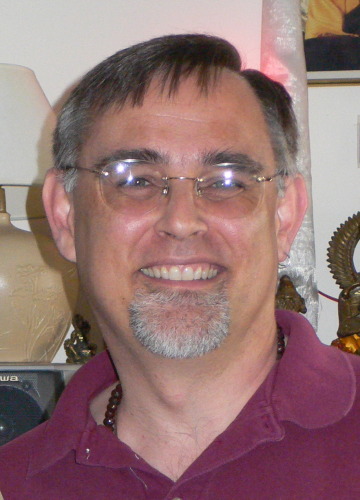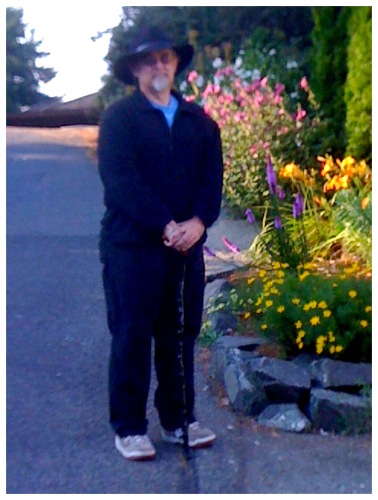![Niklas Gander [Courtesy Photo]](https://wildhunt.org/wp-content/uploads/2014/12/IMG_0314-500x375.jpg)
Niklas Gander [Courtesy Photo]
Dr. Thomas Johnson, also known as Niklas Gander, died Oct. 5, 2014, in Seattle, Washington. As he took his last breath, Willow Moon wiped the tears from his eyes and immediately performed the Tibetan Buddhist practice of Powa. This was to ensure Niklas’ rebirth in the Buddhist paradise of Dewachen or “The Land of Great Bliss,” a place of solace and comfort. There, he will meet his teachers and peers to gain greater knowledge and peace before moving on to another, better life.
As per his wishes, Niklas’ body was kept at home, undisturbed for three days while his spirit finished a Buddhist meditation on death. Friends visited during the day, and Willow Moon kept him company at night, performing regular Buddhist prayers and meditations. When a slight warmth over his heart area moved to the top of his head on the third day, Willow Moon knew that he had completed his meditation.
Niklas was born in Attleboro, Massachusetts, Oct.13, 1959. He was the son of Swedish immigrants Elmer and Britta Johnson. After high school, Niklas attended North Park College in Chicago, where he earned a B.A. degree in music and Swedish. He then went on to receive a master’s degree from the University of Washington in 1986, in German Linguistics and Swedish Literature; and a Ph.D. in Swedish Folklore, Old Norse Language, Literature and Culture from the same institution in 2010.
Niklas was fluent in several languages including English, Swedish, Old Icelandic and German. He taught Swedish language classes at UC Berkeley, the University of Washington and privately. He could communicate with just about anyone who spoke a Scandinavian language. He could translate Old Norse immediately as he read it; he also learned some Faroese and worked hard to acquire an intermediate fluency in Tibetan.
 Niklas was also gifted musician. He started playing the violin in the seventh grade, and after one year, he made the district orchestra. In addition to winning competitions and receiving awards, he played with the civic orchestras in Attleboro and Chicago, where he eventually acquired the second violin chair in the Chicago Symphony orchestra and toured the country.
Niklas was also gifted musician. He started playing the violin in the seventh grade, and after one year, he made the district orchestra. In addition to winning competitions and receiving awards, he played with the civic orchestras in Attleboro and Chicago, where he eventually acquired the second violin chair in the Chicago Symphony orchestra and toured the country.
The violin was not the only way he expressed his musical talent. Niklas had a rich, trained baritone voice. Consequently, he was instrumental in starting the singing group “Our Pleasure” which still performs to this day. One of the reasons he liked the Anderson Faery Witchcraft tradition so much was because there is so much music and singing during the creation of sacred space.
Although Niklas was a gifted linguist, musician, teacher and scholar, his real love was the study and practice of Witchcraft. When he was asked what he would like to do for his dissertation, he immediately replied that he wanted to collect, translate and analyze Swedish Black Art books (svartkonstböcker).
In 1992, as a visiting fellow at the Nordic Museum in Stockholm, Niklas found the remnants of many Black Arts books in both libraries and homes throughout Sweden dating from 1693 to the 1950s. None of these books had ever been completely translated or even published. No studies had been done on these books for over 50 years and they were rotting away.
Niklas rescued a huge portion of Swedish folklore for future generations. He brought his insights gleaned from the old books into his own teaching of Swedish, Swedish folklore, sagas, the Eddas or Old Norse literature, archaeology, religion and mythology. He was even known to sing Swedish songs in class to teach his students “the language of the soul.”
After completing his research, Niklas gave two guest lectures on the material: one at the Folklore Society in Stockholm and one at the Swedish Women’s Educational Association in San Francisco. Additionally, he presented a conference paper at the Society for the Advancement of Scandinavian Study Annual Conference in Salt Lake City. This paper was titled, Something Queer in Images of Old Norse Myth and Magic. It focused on a philological study of the concept of ergi (queerness) as a constellation of related concepts throughout the Germanic region, all of which suggest a greater semantic field than a simple description of unprivileged sexual behavior.
His other writings include: Klokskap eller Häxeri?, which contrasts the traditional cunning folk and the archetypical Witch in Swedish folklore; the book The Graveyard Wanderers (Kyrogårdsgångarna): The Wise Ones and the Dead in Sweden; and his dissertation titled Tidebast och Vändelrot: Magical Representations in the Swedish Black Art Book Tradition.
 Niklas’ love and knowledge of Witchcraft was profound. He received full initiations, elevations and training in the NROOGD tradition, the California Gardnerian tradition, the Gardnerian tradition, the Alexandrian tradition, the Minoan tradition, Bill Love’s hereditary tradition and the Anderson Faery tradition.
Niklas’ love and knowledge of Witchcraft was profound. He received full initiations, elevations and training in the NROOGD tradition, the California Gardnerian tradition, the Gardnerian tradition, the Alexandrian tradition, the Minoan tradition, Bill Love’s hereditary tradition and the Anderson Faery tradition.
Of all these traditions, Niklas preferred to practice and teach the Anderson Faery tradition. He felt that, with the Anderson Faery tradition, there were no gender checks. He could give back by teaching and creating new material based on previous work, and also be respected as an equal. He and his husband could form a coven together. They never had to pretend to be something they weren’t; they could just be themselves and no one ever said they could not stand or work together. In private, the couple continued to practice their own hereditary tradition.
Niklas was the kind of person who easily made friends, and who was always willing to help. He also loved people as much as he loved the subject he was teaching, which made it a fantastic instructor. Whether he was teaching music, language or Witchcraft, he would learn and experience as much as he could before passing on knowledge, in order to give his students the best possible education. He didn’t teach things in isolation but pointed out the connections between diverse subjects to create a richer context for understanding. Niklas was a true scholar with a true heart.
All this demonstrates why he had such a profound impact on so many people. Many have said that, although it was obvious that Niklas was talented and knowledgeable, he never made them feel any less than himself. Niklas learned early on that the secret of truly touching people is to show respect. He practiced that and, in return, people respected him. Niklas changed so many people’s lives for the better, not for fame or money but out of love and kindness; so by any measure his was a life well lived.
The Wild Hunt is not responsible for links to external content.
To join a conversation on this post:
Visit our The Wild Hunt subreddit! Point your favorite browser to https://www.reddit.com/r/The_Wild_Hunt_News/, then click “JOIN”. Make sure to click the bell, too, to be notified of new articles posted to our subreddit.

I had never heard of him, but his life achievements are impressive to say the least. It is so very rare to see Pagans/Witches getting that far in Academia. I will have to look for his articles in the future.
I actually have a very hard time finding any of his academic articles. Would anyone who knew him or his work help? I am interested to read what he thought about ergi.
I wish I would have known him in this life. The description of his death is profoundly beautiful. The description of his life is inspiring. May he be blessed in every way. He obviously left many blessings for his fellow humans over the precious time he lived in this Time/Space. Om.
My husband Ron and I were very sorry to hear of his death. We knew him as Tom Johnson for many years before he (along with Willow, whom we had known for even longer) became my second initiators into Anderson Feri. My thanks to both of them, despite the fact that we eventually parted ways, and my deepest condolences to Willow.
Willow I am saddened. I wish we had kept in touch better after you moved. He was a great joy to know for the short time I knew him.
Sounds like a talented, gifted, and generous man. I wish I could have known him. May Willow have the strength and love necessary to continue and honor his mate by his own life.
Niklas befriended me online during a difficult time when I was questioning my path and my place within a tradition we shared. His wisdom, humor, and kindness meant the world to me at the time, and though we lost touch I thought of him often and with gratitude. I still do. Safe journey, Niklas.
I am a former covenmate of Niklas’, from when he was in the SF Bay Area. He was a good friend and is a great loss. Thank you for sharing is piece about your husband.
I knew him, though not well. We exchanged a few emails on various topics. A gentleman and a scholar.
Niklas and I communicated often, over the years, primarily because I was his Gardnerian upline, but also because we had interesting conversations. I am deeply sorry for your loss, Willow, and sorry, too, that Paganism has lost such a wonderful scholar, priest, and human being.
I’m so sorry I never heard of, nor met, him. He sounds absolutely amazing to have been around, and I send warm thoughts towards his husband, WIllow Moon, his family, coven, and friends.
Given his academic bent AND teaching at UCBerkeley, I wonder if my beloved college advisor, who did her PhD from there on Old Icelandic, would have known him, been taught or mentored by him, but she’s beyond the veil, and I can’t seem to connect for that kind of conversation.
What did your advisor write about for her Thesis?
A Case Grammar Of Verbal Predicators In Old Icelandic. Somewhere around 1974, I think.
Street Credible.
Thanks so much for posting this remembrance, Willow. I have fond memories of Tom’s time in the SF Bay Area. I’m very sorry for your loss. May you be sustained in your grief by shared memories of him with family and friends. In love may he return again.
I’ll be linking this information to the Pagan History Project FB page. Thanks again.